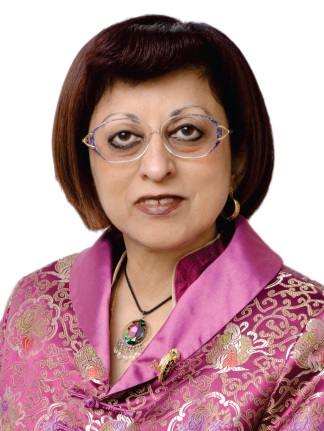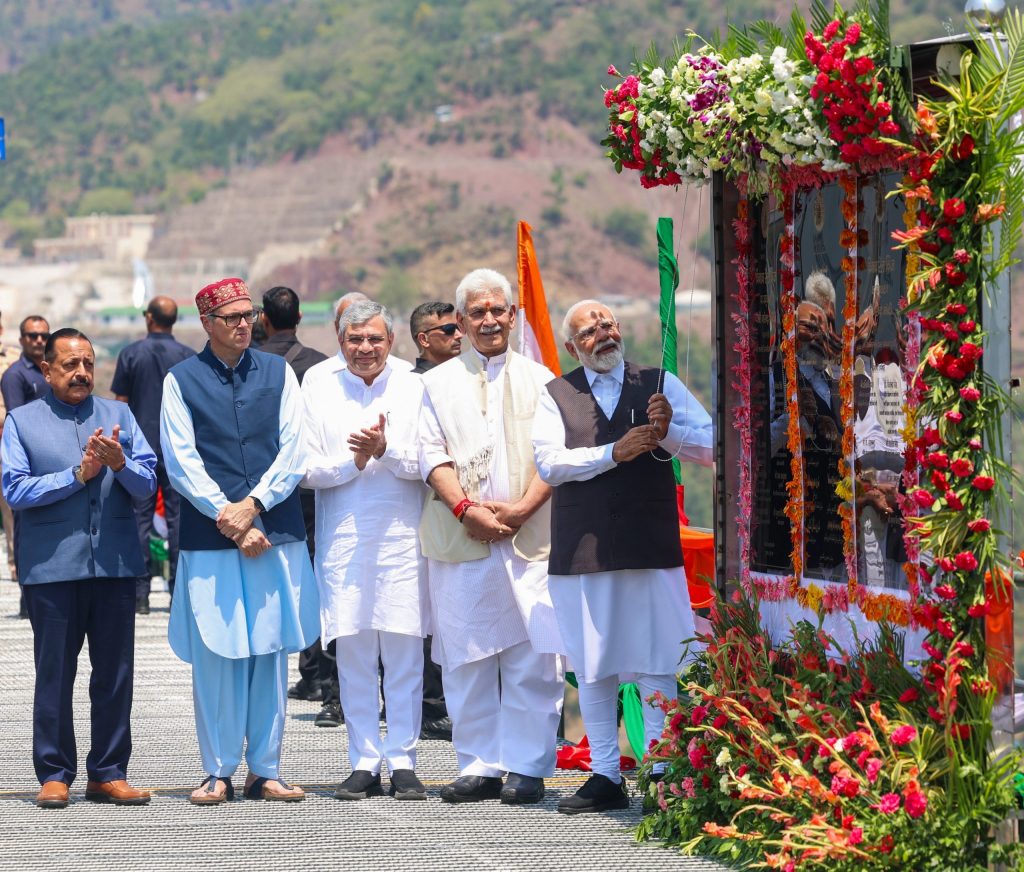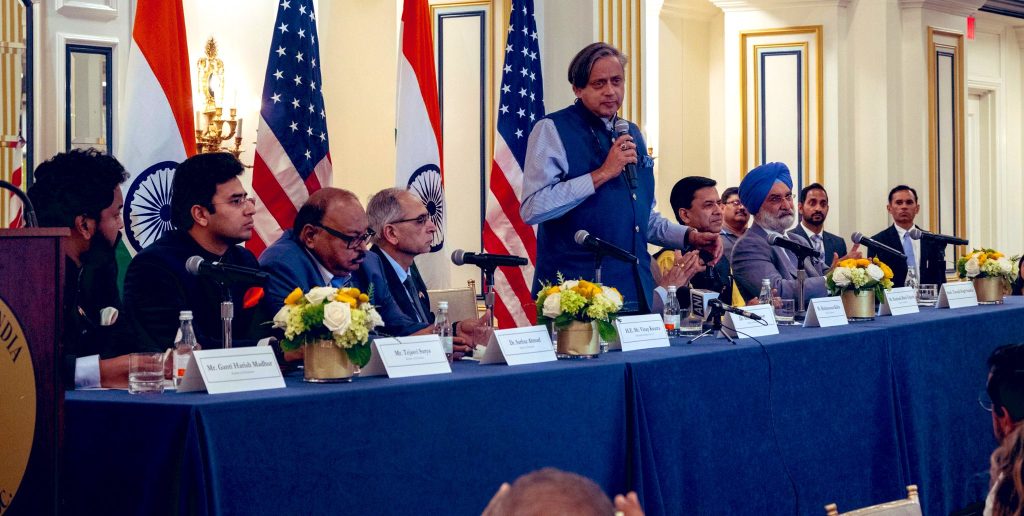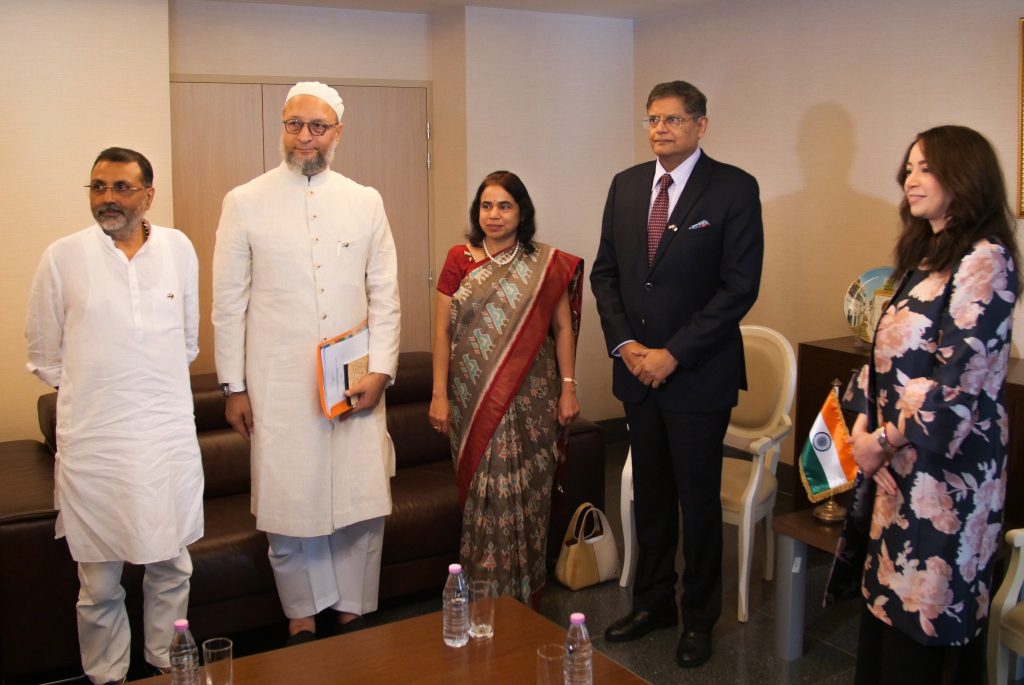By Bhawati Mukherjee

The visit by multi-party delegations, comprising mainly of MPs, to over 33 countries, cutting across geographies, countered propaganda and lies peddled by Pakistan’s spin doctors in the wake of Operation Sindoor. India’s well-conceived global diplomatic outreach projected a picture of national unity and underlined the country’s right to self-defence in the face of cross-border terror attacks, says Amb. (Retd.) Bhaswati Mukherjee.
PM Modi, after inaugurating the world’s highest arch bridge over the Chenab on June 6, 2025, noted that the heinous and cowardly terrorist attacks in Pahalgam that killed 26 male civilians, targeted for their religion, symbolized an attack on “Insaniyat and Kashmiriyat” and were intended to “engineer communal clashes across the country and deprive people of Kashmir of their livelihood”.
 Pakistan’s sinister aims were totally thwarted. India, including the people of Jammu and Kashmir, stood as one to oppose this visceral attack on India’s soul. After holding in abeyance the Indus Waters Treaty and taking a slew of other diplomatic measures, India launched ‘Operation Sindoor’, a calibrated military response targeting terrorist infrastructure and terrorist hubs across the border, without physically crossing the Line of Control (LOC).
Pakistan’s sinister aims were totally thwarted. India, including the people of Jammu and Kashmir, stood as one to oppose this visceral attack on India’s soul. After holding in abeyance the Indus Waters Treaty and taking a slew of other diplomatic measures, India launched ‘Operation Sindoor’, a calibrated military response targeting terrorist infrastructure and terrorist hubs across the border, without physically crossing the Line of Control (LOC).
The operation’s name, ‘Sindoor’, held deep symbolic resonance, since the victims, many newly-married, were singled out for their religion and executed in cold blood in front of their women folk, thereby widowing wives and destroying their ‘sindoor’, symbolic of their marital status. As Shashi Tharoor, MP and the leader of one of India’s outreach delegations, said succinctly: “It is no accident that the colour of sindoor is bright red — close to the colour of blood. Here, it was sindoor ka badla khoon”(Retaliating with blood for wiping out sindoor.).
Commencing on May 7, 2025, Indian armed forces conducted a four-day operation that destroyed at least nine Pakistani aircraft, including surveillance and combat platforms. Drones and missile systems were also neutralised. The scale of retaliation compelled Pakistan to sue for a ceasefire within days, marking a tactical and psychological victory for India. After Pakistan’s Pakistan Director General of Military Operations (DGMO) requested for a halt to operations to India’s DGMO, there was a suspension of Operation Sindoor. It is not, however, a permanent ceasefire.
Countering Propaganda
Operation Sindoor marked a pivotal moment in India’s foreign policy that fused swift retaliatory action with an ambitious diplomatic offensive. Its message was forceful and unambiguous and marked India’s new war doctrine. India would in future regard such acts of terrorism, emanating from across her borders, as acts of war and deal with them accordingly.
 After briefing our strategic partners, India launched a global diplomatic campaign. Multi-party delegations consisting mainly of MPs, accompanied by retired career diplomats were sent to over 30 countries. It successfully countered the false and fake narrative of the Pakistanis, who were as always trying to play the victim card. Supported by India’s Missions, the delegations had high-level meetings and interaction with the foreign media.
After briefing our strategic partners, India launched a global diplomatic campaign. Multi-party delegations consisting mainly of MPs, accompanied by retired career diplomats were sent to over 30 countries. It successfully countered the false and fake narrative of the Pakistanis, who were as always trying to play the victim card. Supported by India’s Missions, the delegations had high-level meetings and interaction with the foreign media.
One team led by Janata Dal (United) MP Sanjay Jha visited Japan, where meetings with the ruling Liberal Democratic Party and the National Security Committee helped re-affirm Indo-Japanese alignment on security. Meetings were arranged with former Prime Minister Yoshihide Suga and key defence figures.
Trinamool Congress MP Abhishek Banerjee played a significant role in the outreach. In Tokyo, addressing the Indian diaspora, he declared: “If terrorism is a rabid dog, Pakistan is its vile handler. We must first unite the world to tackle this wild handler; else it will continue to breed more rabid dogs”.
In an embarrassing miscalculation, Pakistan requested the Malaysian government to cancel all events regarding Operation Sindoor, planned by the Indian delegation. Malaysia declined, demonstrating the new dynamics of the Indo Malaysian relationship.
Another team, led by Dravida Munnetra Kazhagam (DMK) MP Kanimozhi Karunanidhi, travelled to Russia and engaged with leading lawmakers and policy think tanks. In Moscow, discussions included India’s evolving counter-terrorism doctrine. India effectively leveraged its historical relationship with Russia, with the latter acknowledging greater understanding of current threats.
Bridging the Gulf
The visits to the key Gulf States, Saudi Arabia, Kuwait, Bahrain, as well as Algeria, were crowned with great success. The delegation met high-level officials and successfully projected India’s perspectives. Asaduddin Owaisi emerged as one of India’s most important voices. As a prominent Muslim MP from Hyderabad and president of All India Majlis-e-Ittehadul Muslimeen (AIMIM), he was able to challenge Pakistan’s religious framing of the Kashmir conflict. “Pakistan is the epicentre of Takfirism and terrorism”, Owaisi said in high-level meetings in these countries, accusing Islamabad of promoting sectarian ideology and extremism under the guise of Islamic solidarity. His interventions were crucial in shifting the lens from religion to security, ensuring that India’s case was seen through the prism of counter-terrorism, not religious conflict.
During the Kuwait visit, Owaisi criticized Pakistan’s leadership for promoting false propaganda. He criticized Pakistan’s Prime Minister Shehbaz Sharif and Army Chief Asim Munir, calling them “stupid jokers” for sharing a doctored image from a 2019 Chinese military drill as a supposed Pakistani victory over India. He also addressed Pakistan’s alleged support for terrorism, pointing out that the country sought to shield The Resistance Front (TRF), a group linked to Lashkar-e-Taiba, from being listed by the UN Security Council.

He expressed concerns that a $2 billion IMF loan to Pakistan would be diverted to its military rather than public welfare. Addressing the Indian diaspora in Kuwait, Owaisi urged them to remain patriotic, correct misinformation diplomatically, and highlighted religious harmony and the strong Muslim presence in India compared to Pakistan.
In Indonesia, Congress veteran Dr. Salman Khurshid was particularly effective when he endorsed the Indian government’s abrogation of Article 370, calling it necessary for “national integration” and “democratic normalcy” in Jammu and Kashmir. “Kashmir had a major problem,” Khurshid remarked, adding that the removal of special status had opened doors for economic development and constitutional equality. This statement, coming from a senior leader of the opposition, helped India demolish Pakistan’s repeated framing of Kashmir as a Muslim grievance and presented it instead as an issue of governance, equality, and national unity.
Colombia’s Course-correction
One of the more telling episodes of India’s outreach took place in Colombia. Initially, the Colombian government issued a statement expressing concern over casualties in Pakistan following India’s strikes, without acknowledging the terrorist attack in Pahalgam that triggered Operation Sindoor. Shashi Tharoor, leading the Indian delegation to Latin America, expressed deep disappointment. He made it clear that India’s response was a legitimate act of self-defence against a proxy of the banned Lashkar-e-Taiba. After diplomatic briefings and further explanation of the facts, including India’s commitment to precision targeting and civilian protection, Colombia retracted its earlier position. Columbia subsequently endorsed India’s stand against terrorism.
Right to Self-Defence
In the United States, the bipartisan US-India Caucus expressed support. Congressmen Ro Khanna and Rich McCormick acknowledged India’s right to self-defence and its responsibility as a global partner. These endorsements were crucial in countering Pakistani lobbying efforts.
In a bid to regain diplomatic footing, Pakistan dispatched its former Foreign Minister Bilawal Bhutto Zardari to the United States. India’s response, led by a robust multi-party delegation, was firm and nuanced. Congress MP Shashi Tharoor, speaking at several fora, made it clear that Pakistan cannot play both arsonist and fire fighter. Tharoor highlighted the irony that Bilawal Bhutto’s own mother, Benazir Bhutto, was assassinated by terrorists Pakistan once harboured. India’s delegation exposed this contradiction — Pakistan presents itself as a victim while remaining a safe haven for the very forces that destabilise the region.
In One Voice
The strength of India’s global campaign lay in its internal unity. Leaders from different parties, including Milind Deora, Asaduddin Owaisi, Salman Khurshid, Abhishek Banerjee and Kanimozhi Karunanidhi, spoke in one voice against terrorism. They framed India’s military response as one of restraint and necessity, in contrast to Pakistan’s alleged patronage of terrorism.
India’s lonely but principled path in its foreign policy has finally been vindicated.
In a call to India and to Indians to unite against colonialism in September, 1905, Nobel Laureate Rabindranath Tagore had said:
“If they answer not to thy call, walk alone,
If they are afraid and cower mutely facing the wall,
O thou unlucky one, open thy mind and speak out alone.”
The success of the latest outreach by India’s multi-party delegations demonstrates that Bharat has come of age. No longer is it a lone warrior in its struggle for international recognition of the threats posed by cross border terrorism, emanating from Pakistan.
Nor will India hesitate anymore to defend her own people from such threats. “Operation Sindoor” waits patiently. It has only been suspended. It has not ended nor been terminated.
As written in Bhagavad Gita (2-38-39)
“Prepare for war with peace in thy soul.
This is the wisdom of Sankhya-the vision of the eternal.”
(A retired Indian diplomat, Bhaswati Mukherjee served as India’s Ambassador of India to the Netherlands (2010 to 2013) and the Permanent Delegate of India to UNESCO (2004 to 2010). She worked at India’s Permanent Mission to the United Nations and six years as Chief of Staff to the United Nations Human Rights Commissioner. She is the first female president of India Habitat Centre. She is the author of several books, including “India and EU – An Insider’s View,” “Bengal and its Partiton: An Untold Story”, and “The Indentured and their Route: A Relentless Quest for Identity.”)
(This article has been published in special edition of India and the World on Operation Sindoor)
Author Profile
- India Writes Network (www.indiawrites.org) is an emerging think tank and a media-publishing company focused on international affairs & the India Story. Centre for Global India Insights is the research arm of India Writes Network. To subscribe to India and the World, write to editor@indiawrites.org. A venture of TGII Media Private Limited, a leading media, publishing and consultancy company, IWN has carved a niche for balanced and exhaustive reporting and analysis of international affairs. Eminent personalities, politicians, diplomats, authors, strategy gurus and news-makers have contributed to India Writes Network, as also “India and the World,” a magazine focused on global affairs.
Latest entries
 DiplomacyJanuary 5, 2026India walks diplomatic tightrope over US operation in Venezuela
DiplomacyJanuary 5, 2026India walks diplomatic tightrope over US operation in Venezuela India and the WorldNovember 26, 2025G20@20: Africa’s Moment – The Once and Future World Order
India and the WorldNovember 26, 2025G20@20: Africa’s Moment – The Once and Future World Order DiplomacyOctober 4, 2025UNGA Resolution 2758 Must Not Be Distorted, One-China Principle Brooks No Challenge
DiplomacyOctober 4, 2025UNGA Resolution 2758 Must Not Be Distorted, One-China Principle Brooks No Challenge India and the WorldJuly 26, 2025MPs, diplomats laud Operation Sindoor, call for national unity to combat Pakistan-sponsored terror
India and the WorldJuly 26, 2025MPs, diplomats laud Operation Sindoor, call for national unity to combat Pakistan-sponsored terror







